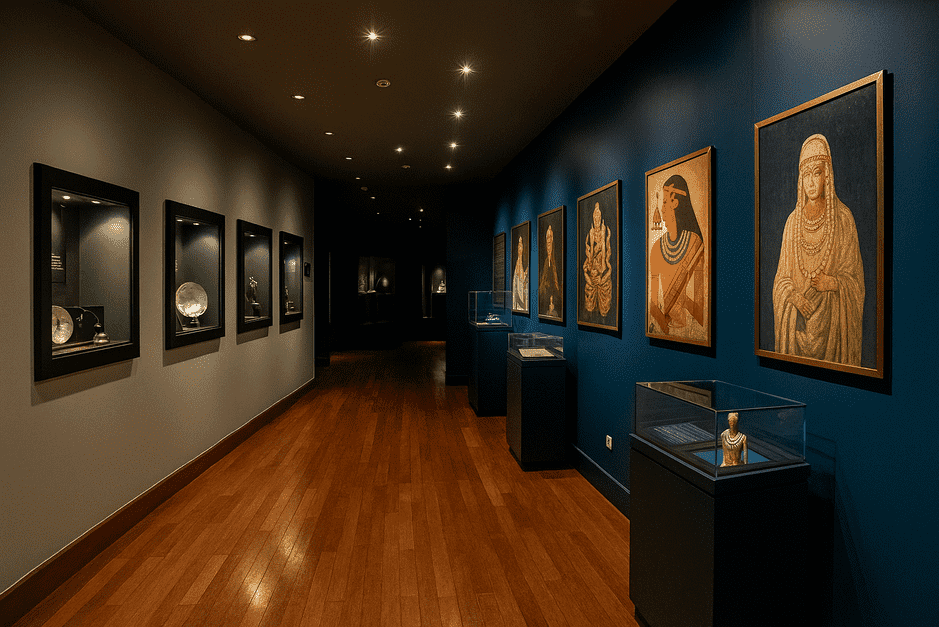The Robert Wan Pearl Museum in Tahiti is the only museum in the world dedicated solely to pearls. Located in Papeete, it actively immerses visitors in the fascinating story of these luminous gems, from myths and legends to modern pearl farming techniques.
Additionally, at this Tahitian pearl museum, you’ll explore how pearls shaped civilizations. Ancient Chinese records describe pearls as “tears of the moon,” while in Rome they symbolized wealth and status. Meanwhile, in Polynesia, pearls were considered gifts from the gods. Research shows that over 70% of early civilizations valued pearls as sacred or royal objects.
One of the main highlights is the world’s largest round Tahitian cultured pearl, a 26mm silver-grey gem weighing 8.7 grams, named the Robert WAN. Specifically, seeing this rare treasure helps visitors understand why Tahitian pearls are considered the “black gold” of the Pacific. As a result, visitors gain insight into both the craftsmanship and cultural significance behind these gems.
Furthermore, visitors learn the steps of pearl cultivation. For example, grafting demonstrations show how oysters produce pearls, while exhibits display the range of colors and shapes unique to Tahitian varieties. In addition, other displays highlight the history of pearl legends across cultures. Also, interactive sections guide visitors through the nuances of choosing the perfect pearl.
Exhibits at the Robert Wan Pearl Museum
- Pearl history across cultures: Asia, Rome, and Polynesia
- Pearl legends: Myths about divine origins and symbolism
- Tahitian pearl farming techniques: Step-by-step cultivation
- Largest pearl display: The 26mm Robert WAN
Moreover, learn more about Understanding Tahitian Pearls to complement your visit.
Why Visit the Robert Wan Museum in Tahiti?
- Only pearl museum in the world
- Perfect for travelers interested in Tahitian culture
- Combines history, craftsmanship, and art
- Offers a boutique with authentic cultured pearls
. Planning your Tahiti trip? Check the guide on Best Things to Do in Tahiti.
. Looking to buy pearls? Read the Pearl Buying Guide.
. Interested in other gems? Explore the History of Gemstones.
Additionally, visit the official Robert Wan website for more details on Tahitian pearl farming and artistry.
“Every pearl carries the story of the ocean and time itself.” – Robert Wan
FAQs About the Pearl Museum in Tahiti
Q: Where is the Robert Wan Pearl Museum located in Tahiti?
A: The museum sits in Papeete, the capital city of Tahiti, and guides visitors easily from the cruise port and downtown area.
Q: What makes this Tahitian pearl museum unique?
A: Experts recognize it as the only museum fully dedicated to pearls, with exhibits covering history, legends, and pearl farming.
Q: How long should I spend at the Robert Wan Museum?
A: Most visitors spend about 1–2 hours exploring the exhibits and boutique.
Q: Can I buy Tahitian pearls at the museum?
A: Yes, the museum boutique actively sells certified cultured Tahitian pearls.
Q: Is the museum family-friendly?
A: Yes, children enjoy the pearl farming displays and stories about pearls.
Small Luxury Hotels FAQ
Introduction
This small luxury hotels FAQ answers common questions about boutique stays. It explains definitions, differences with large chains, and which services to expect. In addition, it covers family options, sustainability, and tips on finding the right property.
What defines a small luxury hotel?
- Fewer than 100 rooms.
- Personalized attention and privacy.
- Strong links to local design.
- Locations in unique urban or rural areas.
As a result, travelers often choose them for a more intimate experience. Moreover, their distinctive style sets them apart from standardized hotels.
Why choose a small luxury hotel?
Personal service
Staff remember guest details, therefore creating a sense of familiarity.
Calm spaces
Unlike large hotels, these properties feel quieter, so you can relax more easily.
Local culture
For example, menus highlight regional produce, and interiors reflect local crafts.
In addition, many guests return because the experience feels authentic.
How do small luxury hotels differ from large chains?
Guest experience
Small hotels provide tailored attention, while chains rely on uniform systems.
Property identity
Each boutique hotel has its own theme. On the other hand, large chains repeat formats worldwide.
Dining approach
Menus change seasonally and locally. Therefore, guests enjoy fresh variety instead of standard global menus.
Are small luxury hotels only for leisure stays?
Business features
- Lounges double as meeting rooms.
- Private dining options support work dinners.
Digital needs
- Fast Wi-Fi supports remote work.
- Quiet spaces help concentration.
Because of these advantages, small luxury hotels appeal to both business and leisure travelers.
What services can you expect?
- Concierge services for tours and dining.
- Fine dining menus with seasonal ingredients.
- Spa and wellness treatments.
- Added extras like minibars and welcome gifts.
Moreover, services shift depending on location. For example, a city hotel might offer cultural tours, while a rural retreat offers farm experiences.
Are small luxury hotels family-friendly?
Options for families
- Connecting rooms for parents and children.
- Child-friendly amenities such as menus or games.
Adults-only stays
- Some properties focus on privacy.
- Guests find peaceful, child-free environments.
Therefore, always check booking policies, because each hotel sets its own approach.
Do these hotels support sustainability?
Sourcing and dining
Farm-to-table meals reduce transport impact. In addition, guests enjoy fresher produce.
Environmental focus
Plastic use is restricted, while refillable bottles are encouraged. Smart energy systems reduce wastage.
Local involvement
Hotels support the community by hiring regionally. As a result, growth extends beyond the property.
How do you find the right small luxury hotel?
Define needs
Decide if food, spa, culture, or privacy is your top priority.
Check guest feedback
For example, repeat reviews about service often signal consistency.
Compare value
Packages may include meals, transfers, or early check-in. Therefore, higher prices can still deliver stronger value.
Are small luxury hotels worth the price?
Value of service
Guests pay for attention, comfort, and privacy. Moreover, experiences feel tailored and unique.
Extras add value
Some hotels include exclusive experiences or benefits. Finally, weigh these extras against nightly rates.
As a result, many travelers feel these hotels justify their price when quality matters most.



